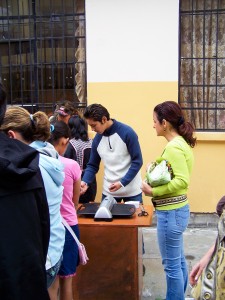[All links lead to Spanish-language pages, unless otherwise noted.]
The National Electoral Council of Ecuador (CNE) has unveiled Voto transparente, Conoce a Tu Candidato (Transparent voting, Know your candidate), a project aimed at familiarizing voters with the campaign platforms of the different presidential candidates. The government portal, www.gne.gob.ec, provides information about the eight presidential tickets, the delegates to the Andean Parliament, and the candidates for national and provincial assemblies as well as foreign postings. Political organizations, social groups, and the media have all contributed to the project, which has coalesced into an electoral Code of Conduct, the Manual de Convivencia. Available throughout social networks and digital media, the handbook is aimed at both political stakeholders and citizens–with the goal of promoting respect and tolerance for differing political leanings and ideologies.
In anticipation of the presidential elections of February 2013, the Code of Conduct lays down 15 basic principles:
Principle #0: Treat others as you would wish to be treated.
Principle #1: Never forget that the person reading your message is a human being whose feelings can be hurt.
Principle #2: Behave online just as you would in real life.
Principle #3: Help maintain a healthy and informative environment for public debate.
Principle #4: Share your knowledge with the community.
Principle #5: Make sure both your opinions and your contributions are friendly, courteous, polite, patient and respectful–this is also a good rule of life.
Principle #6: Respect the privacy of third parties–ganging up on another person is wrong.
Principle #7: Respect the time and bandwidth of other people.
Principle #8: Show your good side online–don't encourage gossip, smear campaigns, or intolerance.
Principle #9: If you write everything in capital letters, people will think you are shouting.
Principle #10: Respect the opinons of others without insulting them; your replies should be polite and considerate and reflect the truth.
Principle #11: Be objective about topics that are of personal concern to you but not necessarily of general interest.
Principle #12: Respect religious beliefs as well as sexual, ideological, and political orientations.
Principle #13: Be tolerant of people whose opinions you do not share.
Principle #14: Do not use hurtful or derogatory language, and do not violate the personal integrity of others.
Twitter feedback
Shortly after the project was unveiled, the online daily hoy.com.ec reported that Twitter users had created the hashtag #redessocialesCNE [CNE social networks] and were circulating their own assessments and jokes:
@darknitch:#redessocialesCNE, Respete el ancho de banda de las otras personas ??? Perdon ancho de banda por utilizarte para leer pendejadas de la CNE
@darknitch:#redessocialesCNE, Respect other people's bandwidth??? Sorry bandwidth for using you to read the CNE's crap.
@Danku_G:#redessocialesCNE la primera regla del CNE en las redes sociales: do not talk about las reglas del CNE en redes sociales…
@Danku_G:#redessocialesCNE the first rule of the CNE for social networks: do not talk about the CNE's rules for social networks…
@xavoviz: No olvide sonreír mientras escribe su tuit. Un troll alegre es un troll eficiente. #redessocialesCNE
@xavoviz: Don't forget to smile when tweeting. A happy troll is an efficient troll. #redessocialesCNE







